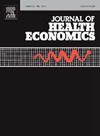Living alone and provider behaviour in public and private hospitals
IF 3.6
2区 经济学
Q1 ECONOMICS
引用次数: 0
Abstract
Following COVID-19, hospitals in many OECD countries are under pressure to absorb backlogs accumulated due to the suspension of health services. Reductions in length of stay can generate capacity to treat patients and increase efficiency. Personal circumstances, such as living alone, can affect how long patients stay in hospital. We test whether such non-clinical factors affect care received by patients. Several countries are experiencing an increase in the number of elderly people who live alone. Patients who live alone may lack support at home leading to delayed discharges despite being clinically fit. We test whether living alone affects length of stay of publicly-funded patients treated by public and private hospitals requiring hip replacement, a common planned surgery, in England. Private providers have stronger incentives to contain costs, which could reduce the extent to which non-clinical factors such as living alone are taken into account when providers discharge patients. Using administrative data and controlling for a rich set of patient characteristics, and hospital and local supply factors, we provide evidence that living alone increases length of stay. The effect is substantive and larger for public hospitals and older patients. It is similar for patients living in urban and rural areas, and across socioeconomic status. More broadly, the study shows that non-clinical factors can affect the care received by patients.
公立和私立医院的独居和提供者行为
在新冠肺炎疫情之后,许多经合组织国家的医院都面临着因医疗服务中断而积压的压力。缩短住院时间可产生治疗病人的能力并提高效率。个人情况,如独居,会影响病人住院的时间。我们测试这些非临床因素是否会影响患者接受的护理。一些国家正在经历独居老人数量的增加。独居的患者可能在家中缺乏支持,导致延迟出院,尽管临床上是健康的。我们测试了独居是否会影响在英国公立和私立医院接受髋关节置换术(一种常见的计划手术)治疗的公费患者的住院时间。私人医疗服务提供者有更强的动机来控制费用,这可以减少医疗服务提供者在让病人出院时考虑独居等非临床因素的程度。通过使用管理数据和控制丰富的患者特征,以及医院和当地的供应因素,我们提供了独居延长住院时间的证据。对公立医院和老年患者的影响是实质性的,而且更大。生活在城市和农村地区以及不同社会经济地位的患者的情况相似。更广泛地说,研究表明非临床因素可以影响患者接受的护理。
本文章由计算机程序翻译,如有差异,请以英文原文为准。
求助全文
约1分钟内获得全文
求助全文
来源期刊

Journal of Health Economics
医学-卫生保健
CiteScore
6.10
自引率
2.90%
发文量
96
审稿时长
49 days
期刊介绍:
This journal seeks articles related to the economics of health and medical care. Its scope will include the following topics:
Production and supply of health services;
Demand and utilization of health services;
Financing of health services;
Determinants of health, including investments in health and risky health behaviors;
Economic consequences of ill-health;
Behavioral models of demanders, suppliers and other health care agencies;
Evaluation of policy interventions that yield economic insights;
Efficiency and distributional aspects of health policy;
and such other topics as the Editors may deem appropriate.
 求助内容:
求助内容: 应助结果提醒方式:
应助结果提醒方式:


